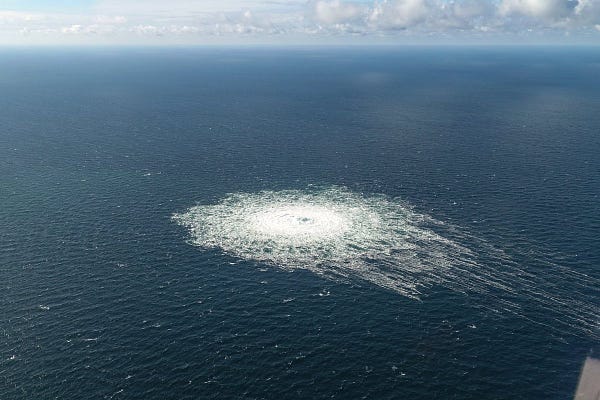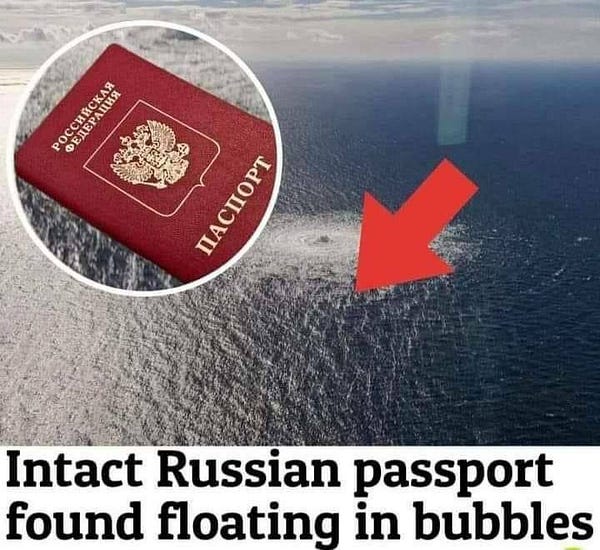The Nord Stream Pipeline Memory Hole
Memory Holes are very real, and we are seeing their usage more and more by both the government and the media, or the politico-media complex. Coined in 1949 by George Orwell, the term memory hole refers to a literal hole in a building where paper is discarded for permanent destruction. Think garbage chute of censorship. From Orwell’s 1984:
When one knew that any document was due for destruction, or even when one saw a scrap of waste paper lying about, it was an automatic action to lift the flap of the nearest memory hole and drop it in, whereupon it would be whirled away on a current of warm air to the enormous furnaces which were hidden somewhere in the recesses of the building.
In its common parlance, memory hole now refers to the burying of an embarrassing, if not credibility-shattering, story. Typically, the original story, followed by the memory-holing of it, is taken on 100% by the politico-media complex. In case there is any question about who this group of people is: Anderson Cooper, Christiane Amanpour, Mika Brzezinski, Nancy Pelosi, Tom Cotton, Joe Biden… John McCain was a key part of this, but he’s gone now. Fret not, though, as these types of people always come and go, and the list goes on and on. These people are the well-known, well-paid, well-trained mouthpieces of the ever-present regime narrative: because of the dangers of the world, everyone should remain in a state of fear and trust the government officials to do the right thing. Always.
In the last couple of weeks, there was an attempt at un-memory-holing a pretty significant event — the explosion of the Nord Stream 2 pipeline in September 2022, and the widespread belief that it was self-sabotage by the Russians. The logic behind that perspective went something like this: Putin is crazy. Germany needs gas. Even though it’s popular to hate gas in 2022, I will set that aside and instead focus on Russia trying to starve Germany and Western Europe of the energy they need. After all, Russia invaded Ukraine. Therefore, they must have blown up their own pipelines!
Let’s revisit a map so that we know exactly what we’re talking about regarding this set of pipelines. Below, you can see that the pipelines start at the westernmost ports of Russia, and travel on the bottom of the Baltic Sea all the way to northeast Germany. The total distance is about 750 miles.
And for a quick recap on the broader Nord Stream project (2 parallel pipelines, each ~750 miles in length):
Nord Stream 1
Purpose: transportation of natural gas from Russia to Germany
Construction timeline: 2005 to 2011
Nord Stream 2
Purpose: increased capacity of natural gas from Russia to Germany
Construction timeline: 2011 to 2021
The explosion of a pipeline is particularly offensive when you consider all the effort that went into the mining of the iron ore, it’s transformation into steel using carbon, followed by its transformation into pipe, and completed with a very complex installation deep in the ocean. When geopolitics interferes with commerce, a tremendous amount of value is destroyed. It reminds me of Goldeneye and the tank scene in St. Petersburg; 007 proceeds to barrel through very old historic buildings, causing a massive amount of damage. At least it’s MI6 in that movie, rather than the CIA. I can still hear my mom gasping as she watches in horror at all the unnecessary destruction.
Goldeneye conveniently leads into the next point, which is exactly the argument that the mainstream made in unison: Surely it was the Russians that blew up their own pipeline, right? Well, we can turn to the third Pierce Brosnan 007 film, The World is Not Enough, in which Elektra King is responsible for bombing her own pipeline in order to gather sympathy for herself from the international community.
Look, you can say what you want about the power or terror of the former Soviet Union, or of the brutality and despotism of the Putin Regime. Besides their nuclear weapons, though — and granted, there are a lot — Russia is essentially a third world country. There are many reasons for why this might be, but the clearest example to me is that they do not have free markets. As Doug Casey puts it, “Russia is really just a gas station with an attached gun store in the middle of a wheat field.” Russia has lots of resources, and they are prepared to wield and defend those resources to their best ability. The United States government sees this and fears this competing power. Since the collapse of the Soviet Union (some prefer the term dissolution) more than 30 years ago, the world has watched Russia restructure and resurface once more as a relevant player on the world stage. World Power? Debatable. Below are three interesting tables, which demonstrate that Russia is clearly a military power, but the size of the economy is a different story.
On the flip side, the export of natural gas from Russia to Germany was a critical — and dare I utter the words mutually beneficial — aspect of this economic and geopolitical relationship. “We have lots of gas supply, you have lots of gas demand. Aren’t you glad we have this pipeline? And aren’t you looking forward to the expansion of capacity?” See below for exports to European countries, with Germany at the top with almost 60 billion cubic meters per year.
This brings up many more questions and implications, and from my point of view, the elephant in the room is the following: The North Atlantic Treaty Organization, or NATO, was established in 1949 (same year as the publication of 1984!), its mission to counter the influence and offense of the Soviet Union. Going back just a few years before that, the Soviet Union emerged as the bogeyman after the defeat of Nazi Germany in 1945… a defeat that took place after the Americans and the British allied themselves with Stalin against Hitler.
Well, fast forward 75 years and we see this very strong partnership — yes, a partnership — between Russia and Germany. Interesting! Interesting enough, in fact, that former President Donald Trump (Remember him? Orange man with wispy hair) had this to say about the Russo-German relationship in July 2018:
Germany is a captive of Russia because they supply — they [Germany] got rid of their coal plants, they got rid of their nuclear, they get so much of the oil and gas from Russia. I think it’s something that NATO has to look at. I think it’s very inappropriate… It certainly doesn’t seem to make sense that they pay billions of dollars to Russia and now we have to defend them against Russia.
As I type that out, it reminds me of Ron Paul during the debate with Rudy Giuliani (also known as the Ron Paul 2008 “Giuliani moment”) when he tries to explain to his fellow candidates, moderators, and audience the insanity of U.S. foreign policy:
Let me see if I get this right. We need to borrow $10 billion from China, and then we give it to Musharraf, who is a military dictator, who overthrew an elected government. And then we go to war, we lose all these lives promoting democracy in Iraq. I mean, what's going on here?
So… back to the memory hole! In the last days of September and first days of October, all the rage was pointing fingers at the crazy Russians. Then, as more questions started being asked, attention and eyeballs were diverted elsewhere. This is commonplace nowadays. Below is the September 28, 2022 headline from The New York Times:
Additionally, to ensure that the passage of time wouldn’t muddy the waters too much as to what everyone was thinking leading up to the explosion and following the explosion, this video surfaced just one week after the leaks were discovered on the pipelines — it’s critical to remember all of the calls by Congress, “experts,” and even the President to destroy the pipeline… Former CIA Director John Brennan wins the award for most ridiculous by stating, “This is clearly an act of sabotage of some sort and Russia is certainly the most likely suspect.” Have a listen!
To counter the “It was Russia sabotaging itself” narrative, here is one of my favorite analysts commenting on the topic on September 27, 2022:


Finally, two amusing tweets — at least if you have a sense of humor and recognize the clown show that has taken place ever since Romney told us in 2012 that Russia is the most significant American geopolitical foe:
Well, fast forward again, this time just over four months, to February 8, 2023 (ten days ago from date of writing this piece). Seymour Hersh — an investigative journalist known for winning the Pulitzer Prize for International Reporting in the 70s — published an article on Substack (cool!) titled, How America Took Out the Nord Stream Pipeline. He has received plenty of backlash from all the political hacks ‘respectable pundits,’ which makes the piece all the more interesting and, in my opinion, credible. The full piece, free to read, is here.
To sanity, and to the destruction of pipelines memory holes!
Regards,
John










